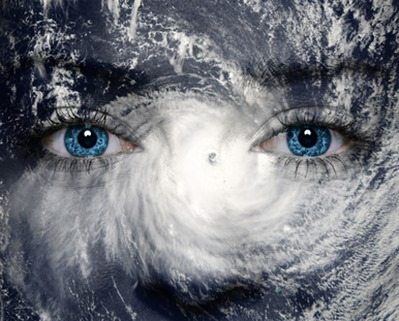Originally posted on June 3, 2014 @ 4:00 PM
Sexual Stereotyping Can Be Deadly
 What’s in a name? Simply changing the name of a Cyclone or Hurricane from Tiffany or Heather to something more masculine like Tyson or Dave 🙂 could save dozens of lives. Severe storms which are assigned softer, more feminine names are perceived to have female like traits, to be softer, gentler and less ferocious according to a study published today in the Proceedings of the National Academy of Sciences.
What’s in a name? Simply changing the name of a Cyclone or Hurricane from Tiffany or Heather to something more masculine like Tyson or Dave 🙂 could save dozens of lives. Severe storms which are assigned softer, more feminine names are perceived to have female like traits, to be softer, gentler and less ferocious according to a study published today in the Proceedings of the National Academy of Sciences.
Cyclones and Hurricanes named by meteorologists to provide clarity and recall of storm information. The significance of the study was to show: “that this practice also taps into well-developed and widely held gender stereotypes, with potentially deadly consequences. Implications are discussed for understanding and shaping human responses to natural hazard warnings”. “This finding indicates an unfortunate and unintended consequence of the gendered naming of hurricanes, with important implications for policymakers, media practitioners, and the general public concerning hurricane communication and preparedness”
Up until the more sexism aware 1970’s, severe storms were given female names apparently due to their unpredictability! Alternating male and female names are now assigned from a predetermined list. Researchers now believe that when a severe storm with a girly name approaches then people are less likely to be as concerned for their welfare, to seek proper shelter, to evacuate or to take necessary precautions.
An analysis of more than 60 years of death rates from US hurricanes shows that severe storms assigned a feminine name result in a greater death toll, seemingly as a direct result of our gender biases.
According to Physics.org
“The problem is that a hurricane’s name has nothing to do with its severity,” said Kiju Jung, a doctoral student in marketing in the U. of I.’s College of Business and the lead author on the study. “Names are assigned arbitrarily, based on a predetermined list of alternating male and female names,” he said. “If people in the path of a severe storm are judging the risk based on the storm’s name, then this is potentially very dangerous.” The research, published in the Proceedings of the National Academy of Sciences, examined actual hurricane fatalities for all storms that made landfall in the U.S. from 1950-2012, excluding Hurricane Katrina (2005) and Hurricane Audrey (1957) because they were much deadlier than the typical storm. “In judging the intensity of a storm, people appear to be applying their beliefs about how men and women behave,” said Sharon Shavitt, a professor of marketing at Illinois and a co-author of the report. “This makes a female-named hurricane, especially one with a very feminine name such as Belle or Cindy, seem gentler and less violent.”
In a follow-up set of experiments, Jung and his colleagues examined how the gender of names directly affected people’s judgments about storms. They found that people who were asked to imagine being in the path of “Hurricane Alexandra” (or “Christina” or “Victoria”) rated the storm as less risky and intense compared to those asked to imagine being in the path of “Hurricane Alexander” (or “Christopher” or “Victor”).
“Such gender biases are pervasive and implicit,” said Madhu Viswanathan, a professor of marketing at Illinois and a co-author of the study. “We found that people were affected by the gender of hurricane names regardless of whether they explicitly endorsed the idea that women and men have different traits. This appears to be a widespread phenomenon.”
Do gender biases affect any other aspects of Workplace Health and Safety or Risk Management?
Some people may get a little chuckle out of this: The difference between men and women


Do you have any thoughts? Please share them below